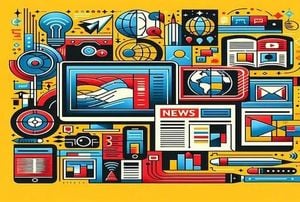The intersection of human ingenuity and artificial intelligence is sparking a transformative moment in many industries today. AI technologies, particularly Large Language Models (LLMs), are not only changing how we work but are also redefining how we think, learn, and interact with the world. In this ongoing AI revolution, various sectors—from education and healthcare to finance and entertainment—are experiencing a wave of innovation that promises to reshape their operational frameworks radically.
The emergence of LLMs, like OpenAI's GPT and similar platforms, has brought forth a paradigm shift in content creation, customer service, and data analysis. These models have the ability to process and generate human-like text based on the input they are given, which opens up a realm of possibilities for businesses. For instance, organizations are leveraging AI to automate customer interactions through chatbots, enhancing user experiences while reducing operational costs. With the capacity to operate around the clock, these AI solutions are revolutionizing customer service, making it more efficient and responsive.
In the realm of education, AI's potential is increasingly being harnessed to personalize learning. Adaptive learning platforms utilize AI algorithms to analyze students' learning styles and tailor educational content accordingly. This approach not only enhances engagement but also aims to improve educational outcomes by addressing individual learning needs. As educational institutions integrate more technology into their curricula, the role of AI in facilitating personalized education continues to grow.
AI is not limited to creativity and efficiency; it also holds promise in the realm of healthcare. Advanced AI models are being developed to assist with diagnosis, treatment recommendations, and even predicting patient outcomes. For example, AI algorithms can analyze vast datasets of medical records to identify patterns that help healthcare professionals make better informed decisions. This use of AI can lead to improved patient care, quicker diagnosis, and ultimately, more effective treatment strategies.
Yet, despite the advancements and the significant benefits AI offers, concerns surrounding ethics and accountability remain prominent. Issues of bias within AI algorithms, privacy concerns regarding user data, and the broader implications of replacing human jobs with automation raise questions that society must address. Experts urge that as AI technologies develop, there should be a strong focus on establishing ethical guidelines that ensure fairness and prevent discrimination in AI-driven decisions.
To illustrate the complex dynamics of AI regulation, consider the efforts being made in the European Union to draft robust AI legislation. The EU's approach aims to create a balanced framework that promotes innovation while safeguarding citizens' rights. The implications of such legislation could set benchmarks for other regions as they navigate the regulatory landscape of AI technology. As countries grapple with how best to implement AI in various sectors, the continued dialogue between tech developers, lawmakers, and the public is critical.
The finance industry is also seeing a profound transformation due to AI. Financial institutions are deploying AI-driven analytics to detect fraudulent behaviors, manage risk, and enhance customer experiences. Algorithms can analyze transactional data in real-time, flagging suspicious activities that might otherwise go unnoticed. This high-level scrutiny allows for not only enhanced security measures but also faster service delivery.
Additionally, the entertainment sector is undergoing an AI-driven renaissance. Content creation platforms are utilizing AI to help creators generate new narratives, edit videos, and even propose music mixes. This technology not only streamlines the production process but also encourages creativity by enabling users to experiment with unique ideas that may not have been conceived without AI assistance.
The potential for AI innovation extends into other creative fields such as art and literature, where AI-generated pieces are provoking mixed reactions. Some see AI as a new collaborator in the arts capable of producing works that challenge traditional perceptions of creativity. While critics raise concerns about the authenticity of AI art and the implications for human artists, the dialogue around AI in creative fields continues to evolve.
As we witness the rapid integration of AI into everyday practices, the implications for future work, relationships, and societal structures become increasingly complex. The rise of AI ushers in not just a technological revolution but a fundamental shift in human identity and agency in an economy that increasingly relies on intelligent systems.
Looking ahead, stakeholders across sectors are urged to prepare for the multifaceted challenges brought on by this AI boom. Educational initiatives aimed at workforce retraining and upskilling will be integral in equipping individuals with the competencies required to thrive in an AI-dominated landscape. Collaboration between governments, educational institutions, and businesses will play an essential role in shaping a future where technology is leveraged ethically and responsibly.
In conclusion, while the advancement of AI presents promising opportunities for innovation and efficiency across sectors, it also calls for a cautious approach to governance and ethical considerations. The task of balancing innovation with human values is a delicate yet imperative endeavor as society embraces the AI-driven future ahead.



